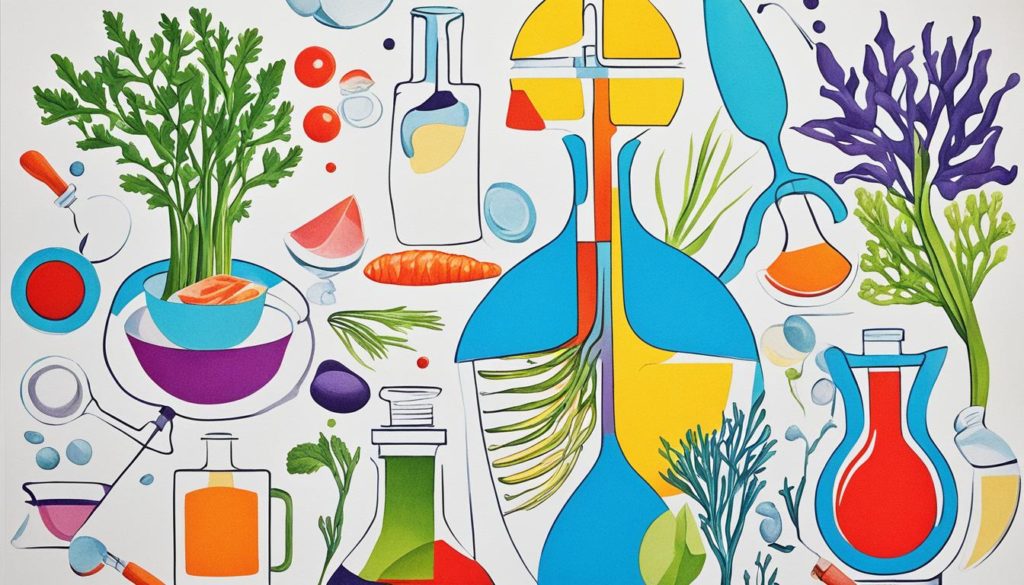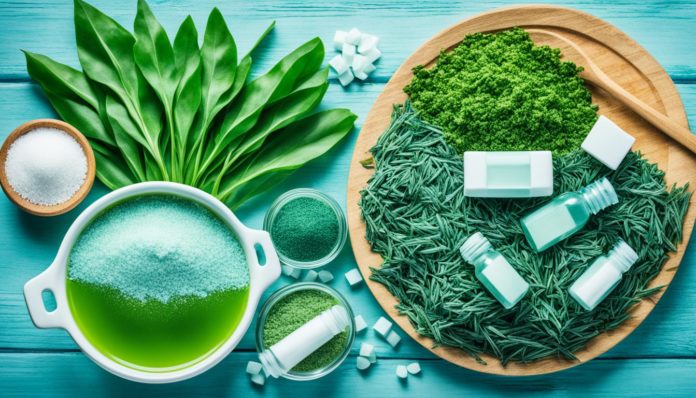Iodine is a key mineral that helps keep us healthy. It plays a major part in making thyroid hormones, which control many body functions. These include how we use energy and how our bodies grow.
Knowing how iodine benefits us is important. Without enough, people can get conditions like goiter or hypothyroidism. Pregnant women need to make sure they get enough iodine. Their babies’ growth depends on it.
Key Takeaways
- Iodine is a crucial nutrient for producing thyroid hormones.
- Thyroid hormones regulate metabolism and energy production.
- Adequate iodine intake prevents thyroid issues like goiter.
- Pregnant women need sufficient iodine for proper fetal development.
- Understanding the health benefits of iodine promotes better health management.
What is Iodine?
Iodine is a key trace mineral from the Earth’s soil and ocean waters. It is crucial for human health. Showing deep purple color and strong odor in its basic form, iodine is necessary for many body functions.

Definition and Chemical Properties
Iodine belongs to the halogen group in the periodic table, known as group 17. It mixes a bit with water and reacts strongly with many metals. Iodine makes important compounds like iodides and iodates, vital for our body’s biochemistry.
Sources of Iodine
It’s important to get iodine from what we eat. Seafood, dairy, grains, and iodized salt are key sources. They help meet our body’s iodine needs for good health. In low iodine areas, iodized salt is a simple solution.
| Food Source | Iodine Content (mcg/serving) |
|---|---|
| Seafood | 63 |
| Dairy Products | 89 |
| Grains | 45 |
| Iodized Salt | 71 |
Importance of Iodine in the Body
Iodine is crucial for our health. It plays a key part in making thyroid hormones. These hormones control our metabolism and keep us healthy.

Role in Thyroid Function
Iodine is key for producing thyroid hormones T4 and T3. These keep our metabolic rate healthy. They help in growth, development, and metabolism. Iodine ensures our cells work well.
Metabolic Effects
Thyroid hormones need iodine to control metabolism. They’re involved in making proteins and managing metabolism. Adequate iodine stops you from feeling tired or gaining weight from a slow metabolism. It’s vital for good metabolic health.
| Iodine Function | Impact |
|---|---|
| Thyroid Hormone Synthesis | Maintains metabolic rate |
| Metabolic Regulation | Prevents lethargy and weight gain |
Benefits of Iodine
Iodine plays a key role in many areas of our health. We will look at its benefits for thyroid health, immune support, and brain development.
Thyroid Health
Iodine keeps the thyroid gland healthy. It is needed for making thyroid hormones. These hormones control how fast our bodies use energy and are vital to our health.
Not having enough iodine can lead to problems. For example, hypothyroidism and goiter can develop. This shows iodine’s importance for a healthy thyroid.
Immune System Support
Iodine also helps the immune system. It works with antioxidants and boosts immune cells. This helps our body fight off germs.
Having enough iodine is key for a strong immune defense.
Neurological Development
For brain health, iodine is crucial, especially in early life and during pregnancy. It supports the brain’s development and thinking skills.
Pregnant women and children need enough iodine. It’s essential for their brain health and cognitive functions.
Iodine Deficiency: Causes and Symptoms
Iodine deficiency is a huge issue worldwide that affects our health. It’s vital for making thyroid hormones. These hormones help our bodies in many ways.
Common Causes
The main causes of iodine deficiency link back to what we eat. Often, the soil doesn’t have enough iodine. So, the crops grown there are also low in iodine. This means people who eat these crops don’t get the iodine their body needs. Other reasons include:
- Consumption of food from iodine-deficient areas
- Not using iodized salt enough
- Avoiding iodine-rich foods like dairy and seafood in diets such as veganism
Early Symptoms
The symptoms of iodine deficiency can be different for everyone. Some common early signs are feeling tired, gaining weight without a reason, and being more sensitive to the cold. This happens because the body makes less thyroid hormone. If we don’t address it, more serious problems can develop, such as:
- Goiter, which is when the thyroid gland swells
- Cretinism in babies, leading to poor growth and development
- Worse mental functions in adults
How to Identify Iodine Deficiency
Finding out if you’re low on iodine is key for your thyroid’s health. There are a few ways to check for iodine deficiency. Each method provides important information.
- Clinical Evaluation: A healthcare provider can look at physical signs and your health history.
- Dietary Assessment: It’s important to check if you’re eating enough iodine-rich foods. This means keeping track of what you eat.
- Laboratory Testing: Some important tests for iodine deficiency are:
| Test | Description | Relevance |
|---|---|---|
| Urinary Iodine Concentration | This test measures the amount of iodine excreted in the urine. | It’s a very reliable test for iodine deficiency because most consumed iodine leaves the body in urine. |
| Thyroid-Stimulating Hormone (TSH) Levels | Measures the TSH levels in the blood to assess thyroid function. | High TSH levels can mean the thyroid is not getting enough iodine. |
| Thyroid Ultrasound | Imaging technique to evaluate the structure and size of the thyroid gland. | This can spot goiters or other issues that suggest iodine deficiency. |
Iodine-Rich Foods
Iodine is vital for our health. Eating foods high in iodine prevents deficiencies and boosts wellness. This section covers the best iodine sources: seafood, dairy, and certain veggies.
Seafood
Seafood packs a lot of iodine. It’s essential for a healthy diet. Foods like fish, seaweed, and shellfish are iodine-rich. They help your thyroid and keep you healthy. Top choices include:
- Cod
- Tuna
- Shrimp
- Seaweed
- Scallops
Dairy Products
Dairy is great for iodine, especially with iodine-enriched feed for cows. It helps make thyroid hormones. Important dairy sources are:
- Milk
- Cheese
- Yogurt
Vegetables
Some veggies also offer iodine, especially from iodine-rich soil. They add variety to your diet and ensure you get enough iodine. Notable ones include:
- Potatoes
- Spinach
- Beans
Check out a detailed guide on iodine rich foods for health benefits. Add a mix of these foods to your meals.
| Food Category | Examples | Main Benefit |
|---|---|---|
| Seafood | Cod, Tuna, Shrimp | High iodine content |
| Dairy Products | Milk, Cheese, Yogurt | Good source of diary iodine |
| Vegetables | Potatoes, Spinach, Beans | Rich in plant-based iodine |
Choosing an Iodine Supplement
When picking an iodine supplement, think carefully to get the right iodine dosage for you. Look at factors like dose, form, and possible allergens in your choice.
Potassium iodide and kelp are common choices. Potassium iodide is liked for its clear iodine amount, which helps in adjusting the dose accurately. Kelp, on the other hand, is natural seaweed that offers extra minerals but might have varying iodine levels.
“It is advisable to consult a healthcare provider before starting any iodine supplement. They can help tailor the dosage to your individual requirements, considering your health status and dietary intake.”
| Supplement Form | Characteristics | Recommended Iodine Dosage (mcg) |
|---|---|---|
| Potassium Iodide | Consistent iodine content, highly bioavailable | 150-300 |
| Kelp | Natural source, variable iodine levels | Not standardized |
| Sodium Iodide | Alternative to Potassium Iodide, less common | 150-300 |
Having a varied diet along with the right iodine supplement can keep your thyroid healthy. Always check your iodine levels and amount you take, since too much can cause problems.
Iodine and Thyroid Health
The iodine thyroid connection is key to our well-being. Iodine helps make thyroid hormones. These hormones, mainly thyroxine (T4) and triiodothyronine (T3), control many body functions. They affect our metabolism, heart rate, and how warm we stay.
Getting enough iodine helps prevent hypothyroidism. This condition means you have too little thyroid hormone. It can make you feel tired, gain weight, and feel down. Keeping the right level of iodine in our diets can prevent thyroid problems. This includes hypothyroidism and goiter.
| Aspect | Thyroxine (T4) | Triiodothyronine (T3) |
|---|---|---|
| Role | Regulates metabolism, heart rate, and body temperature | Influences digestion, muscle control, and brain development |
| Iodine Requirement | High | High |
| Disruption Due to Iodine Deficiency | Reduced metabolic rate, weight gain | Impaired cognitive function, developmental issues |
Iodine plays a big role in keeping our thyroid healthy. Knowing how iodine works with our thyroid helps us avoid hypothyroidism. It leads to better health overall. Making sure we get enough iodine is crucial. It helps our thyroid hormones work right and stops health problems before they start.
Potential Risks of Excess Iodine Intake
Iodine is key for our health, but too much can be harmful. If we take in too much iodine, our thyroid might not work properly. This can lead to serious health issues.
Hyperthyroidism
Too much iodine can cause hyperthyroidism. This means the thyroid makes too much hormone. Symptoms include losing weight, heart palpitations, and feeling anxious. When this happens, our body’s metabolism speeds up. This can cause big health problems over time.
Other Health Concerns
Taking in too much iodine can cause other health issues. If we do this for a long time, our thyroid may not function right. Problems can include thyroiditis and even thyroid cancer. It’s important to keep iodine intake at recommended levels. This helps us stay healthy and avoid these problems.
Consulting with a Health Professional
To keep your thyroid in tip-top shape, balancing nutrients and getting advice from experts is key. Before changing your diet or trying new supplements, it’s important to talk to a professional healthcare advisor. A visit to a thyroid specialist or a dietitian is very helpful, especially for those with thyroid issues.
Health experts can create a diet plan that’s just right for you. They use detailed check-ups to give advice that supports your health and thyroid. Getting help from professional healthcare advice also reduces risks that come from taking too much iodine.
Seeing a thyroid expert regularly helps keep track of your health. They can spot problems early, which means quicker action can be taken.
Be proactive about your thyroid health by working with health professionals. Their advice makes sure your diet and supplements are helping, not harming, your health goals.
Conclusion
Iodine plays a crucial role in our health, especially for the thyroid and our overall well-being. It’s important to understand how iodine works in the body. Also, knowing how to keep the right balance of iodine through what we eat is key. This essential mineral helps make thyroid hormones. These hormones are needed for body functions, growing, and developing.
Foods like seafood, dairy, and some vegetables are important because they have iodine. Eating these can help us get the iodine our bodies need. This supports our thyroid health and helps us feel good overall. Using iodized salt is another way to prevent not having enough iodine, which is a problem worldwide.
If diet alone doesn’t provide enough iodine, supplements might be needed. However, always do this with advice from healthcare experts. Too much or too little iodine can be harmful. For detailed info on iodine, like how much you need and the best foods for it, check out the NIH’s fact sheet. It talks about the importance of keeping a good iodine level for thyroid health.
FAQ
What is iodine and why is it important for our health?
Iodine is a vital mineral that helps make thyroid hormones. These hormones control our metabolism and energy. Pregnant women need it for their baby’s growth.
What are the main sources of iodine in the diet?
Iodine comes from seafood, dairy, grains, and iodized salt. These foods help us get enough of this important mineral.
How does iodine benefit thyroid health?
Iodine helps the thyroid gland make hormones for regulating our body. Without enough iodine, we can face thyroid issues like goiter and hypothyroidism.
What are the symptoms of iodine deficiency?
Low iodine can cause tiredness, weight gain, and feeling cold often. Not fixing it can lead to serious problems like goiter and mental issues.
What are some iodine-rich foods?
Seafood, including fish and shellfish, is rich in iodine. Dairy like milk and cheese also has a lot, especially from iodine-fed cows. Iodine can also be found in vegetables like potatoes and beans if they’re grown in iodine-rich soil.
How can one determine if they have an iodine deficiency?
To find out if you lack iodine, doctors check your diet and do tests. They test your urine, check thyroid hormones, and might use ultrasound.
What should one consider when choosing an iodine supplement?
Choosing an iodine supplement involves considering the dose and form. Talk to a healthcare provider to find what’s best for you.
What are the potential risks of excessive iodine intake?
Too much iodine can cause health problems like hyperthyroidism, with symptoms like weight loss and anxiety. Long-term, it may affect the thyroid gland, leading to diseases.
Why should one consult a healthcare professional regarding iodine intake?
Talking to a healthcare professional about iodine is key. They guide you on your dietary needs and supplement use, considering your health history.


